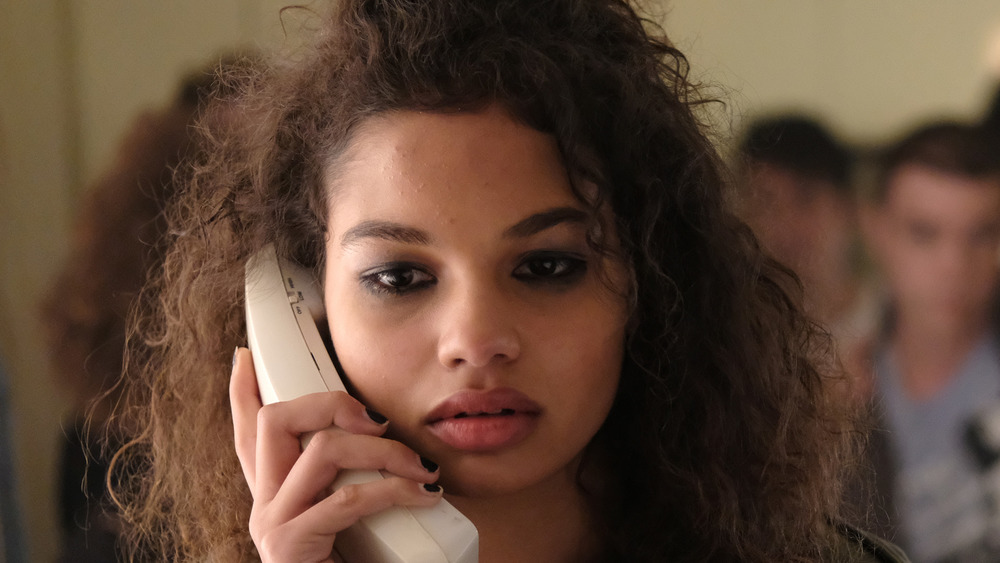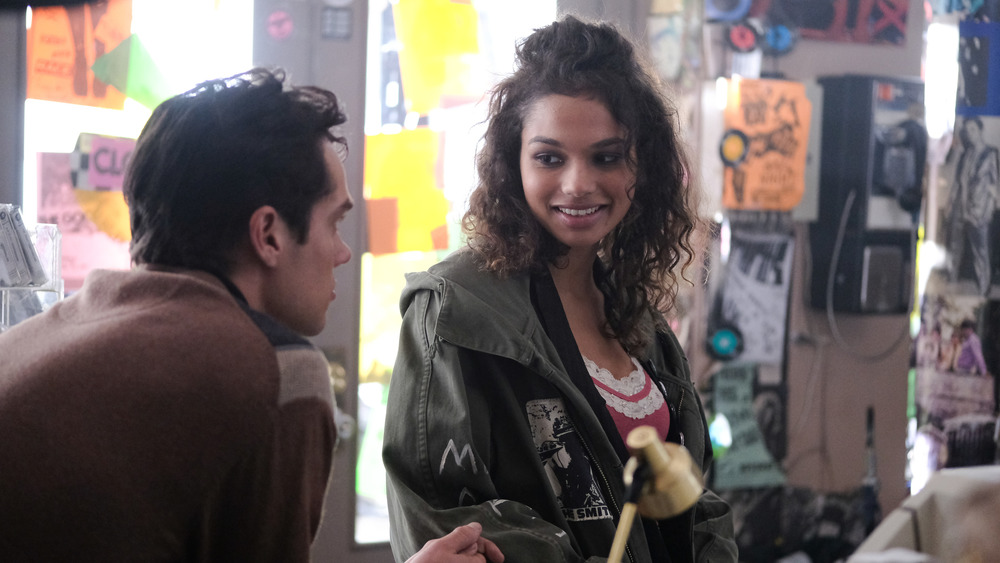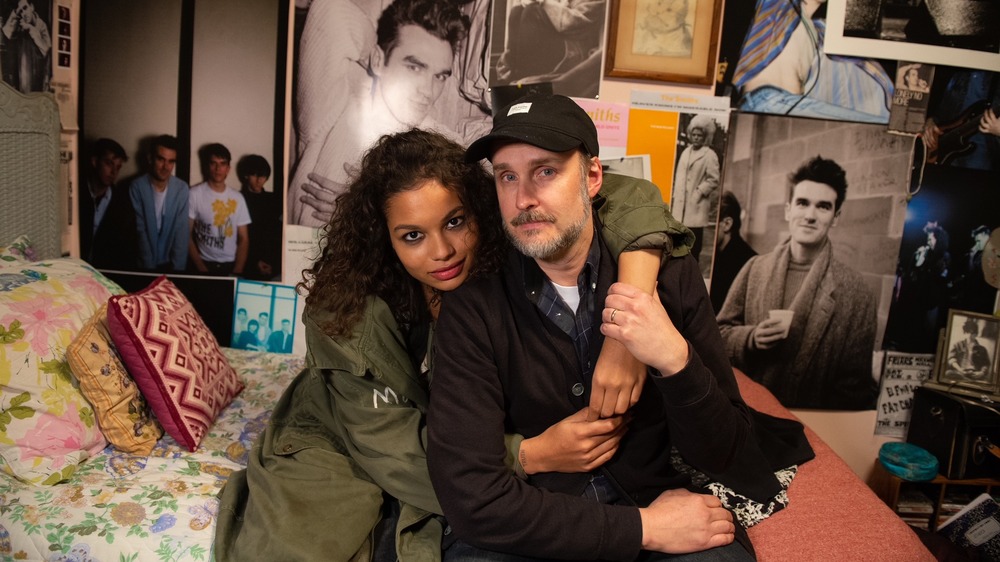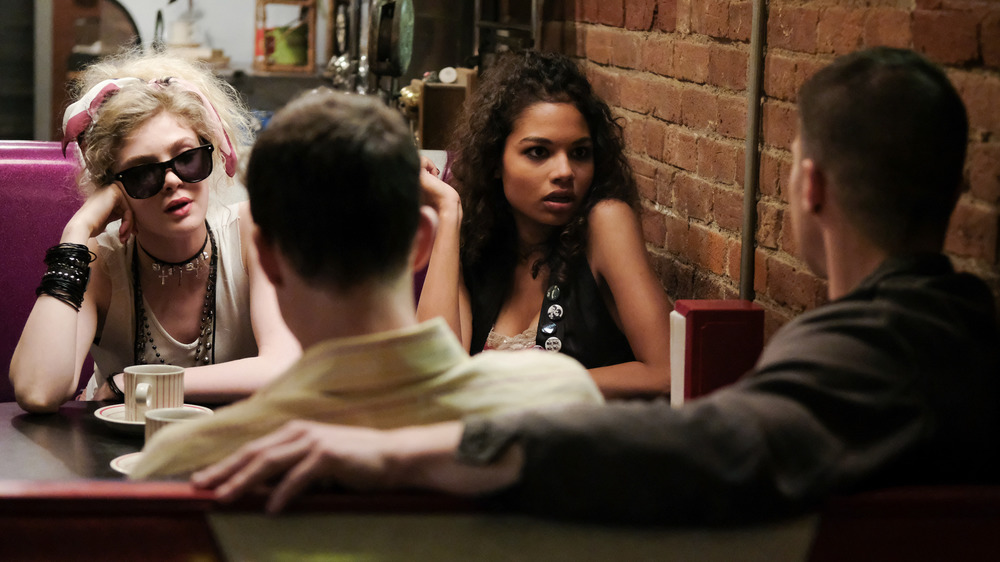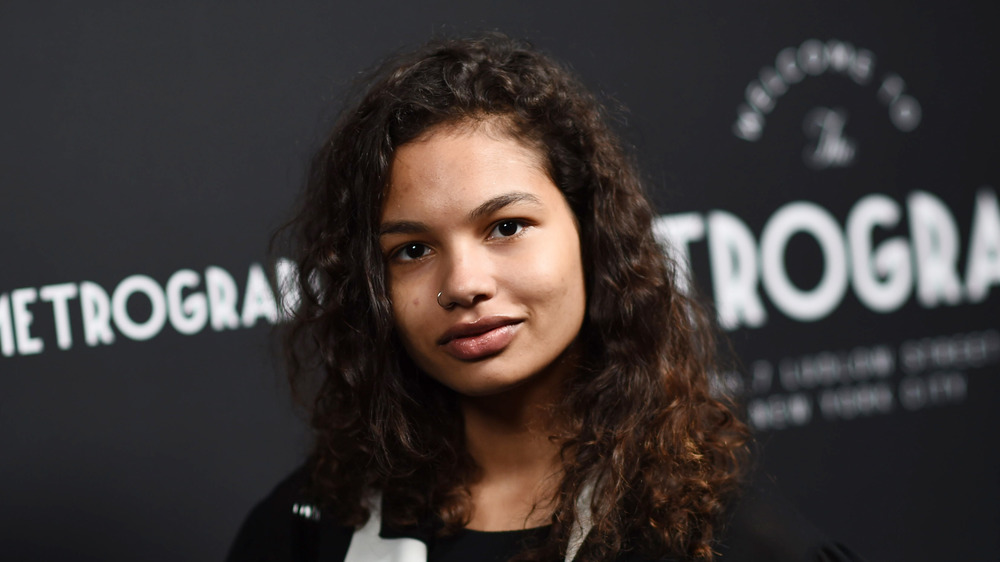Shoplifters Of The World Star Helena Howard On The Smiths And Relating To The '80s - Exclusive Interview
In today's media-saturated, Spotify-fueled world, musical artists flit across our screens at 1,000 miles per hour, with the next record only a couple of taps away. The film Shoplifters of the World attempts to capture a different era, when hunting down records from artists you cared about became something of a holy crusade, and when, if you were young, the rise and fall of a favorite musician or band could feel like a matter of life and death. For the group of friends at the center of the movie's story, that band is the Smiths, and Shoplifters chronicles one special night this gang of misfits spends together after learning that their rock heroes have broken up.
The film's main character is Cleo, a young, directionless Smiths fan who's preparing to watch her friends scatter as adulthood and commitments like military enlistment come calling. She's portrayed by Helena Howard, who's been a rising star in Hollywood since her critically hailed turn in 2018's Madeline's Madeline. In Shoplifters of the World, Howard perfectly captures both the righteous passion and the crushing fear of the unknown felt on the cusp of growing up, all set to a soundtrack chock full of the Smiths' best songs.
We caught up with Howard to talk about her Smiths fandom, finding the shinier side of life, and what it's like bouncing between an indie project like Shoplifters and her work on Amazon's The Wilds.
How Helena Howard joined Shoplifters of the World and found Cleo
What was it that drew you to this project, and what did you find appealing about the character of Cleo, specifically?
What drew me to this project was the Smiths. It's actually really funny: I was watching American Honey because it was recommended to me. And then when it was done, I got curious to search Sasha Lane on IMDb, as you do. And I saw that she was going to be filming this film called Shoplifters of the World about the Smiths. And I was like, "Wait, is she even a Smiths fan? How are you going to make a movie about the Smiths if you're not even a real Smiths fan?" So I was doing all this research on the internet, and it was like, "Yeah, this film's supposed to be filming, but it hasn't been filming, blah, blah, blah." And then a week later I get an email with an offer for the same movie that I see she was attached to, for the same role. And I'm thinking, "Wait, wait, wait, wait, is the universe doing something weird? Is there like a rip in the time continuum? What is going on?" So yeah, that's what drew me to the project. And I didn't even know that we were going to come together, but I actualized it.
And Cleo, I think she's so relatable. Like everyone else, she is trying to find herself. She's found herself in a really great iconic band that speaks to her and so many other outcasts and misfits during that time. And then they break up during the worst time you could possibly break up, because her friends are all going to go off and live their lives and are growing up, but she still hasn't figured out what she's going to do with her life yet and doesn't have a purpose. But her purpose was the Smiths and now that purpose is gone and broken up. She's a lost soul, and to be able to bring that to the screen is really nice.
You got your career start at a very early age and had a clear direction. What parts of yourself did you see in Cleo, given that she is this, like you said, lost soul, and your experience is very different?
Aside from loving the Smiths.
Right.
I think, with Cleo, she does a really great job of having a façade and telling stories to make life seem a little bit fuller and richer than it actually is. And I've noticed that, when I was younger, I would sort of do the same because your real life isn't as shiny. It's not as fascinating as the one that you're making up or the stories that you're creating to make your life seem fuller than the emptiness that you have to return to every single night. So yeah, in that way, I related.
Helena Howard's Smiths fandom is a light that never goes out
It sounds like you were a preexisting Smiths fan before you came into this, so let's talk about your Smiths fandom. How did you discover the band and what they mean to you personally?
I don't really know how old I was. I guess I always grew up in a household with that kind of music because my mom grew up in the '80s scene as a new wave, punk rocker, goth chick with her gay friend in New York City, just going around all the clubs and feeling the music. I just felt the music growing up, whatever was playing — so, the Smiths and Morrissey. I do remember one of the first Morrissey songs, "The Father Who Must Be Killed," that just like... oh, I loved that song, especially every time I was upset with my parents. Songs are so great to just get out all of your emotions because obviously you're not going to go and slit your father's throat open, unless you are a psychopath. But for me, whenever I just wanted to punch him in the face, it'd be like (singing).
I love the Smiths and everything they stand for. Morrissey did use music to raise consciousness and make statements, and you see it in a lot of their music and a lot of their performances and just the band as a collective. I think it's really great.
Did everyone involved in the cast come into this as a Smiths fan, or did you have to educate anybody?
I didn't do the educating. Stephen Kijak did. I think he's probably the biggest Smiths fan there is, that guy. That's why he made this film. There were some people who hadn't listened to the Smiths or Morrissey before, and I'm just like, "Who are you?"
Did you guys have group listening sessions or anything like that to get in the vibe?
Okay, so we did hang out a few times. Well, a lot, actually. We were together all the time. But the music was played on set a lot, to really have in us, and Stephen sent each of us certain playlists for our characters, that they would be listening to, so that was really great.
I'm just curious, as a fan, how you feel about Morrissey these days? He's weirdly fascist now, and it's so strange.
I think we, as people, are constantly evolving — and so is the world, right, supposedly? It's supposed to be. We're in evolution, right? And the way that people think is a result of where they are, who they've been surrounded by, and the things that have happened. It's all a cause and effect. Morrissey having the platform that he does to be saying some of the things... it is a bit concerning, but at the same time, I think the only way we as a collective can grow is if, yeah, someone says something that I don't like, okay, I listened to that. I maybe don't understand it at first, but how do I understand them so that they can understand me? And then we can come to a place of understanding and move on from there. There's just too much canceling others out because we don't agree with one another. And if that keeps happening, there's not going to be anyone to listen to anymore because eventually everyone's going to say something that everyone doesn't agree with.
How Helena Howard got into Shoplifters of the World's '80s vibe
Are the Smiths your Smiths, or did you have another... that's a weird way of putting it, but did you have another band or artist either growing up or now that means as much to you as the Smiths mean to Cleo and her friends in the film?
Yes. I love Radiohead and Thom Yorke, and that music saves me. And it's just always so different, but the same. You know it's Radiohead when you're listening to it. You're not like, "Oh, who is this?" And it's the same for the Smiths. When it's an artist, they're consistent, but it doesn't have to be the same beat, the same kind of lyrics, the same... it's not stagnant, it's fresh, it's new, and they have their stamp on it, which I love about Radiohead, Led Zeppelin, the Smiths, all these great bands.
What's your favorite record of theirs?
Oh, I mean, I love In Rainbows. Everyone would say OK Computer, but... Hail to the Thief is also very underrated.
Has there been a pop culture event that has affected you in the way that something like the breakup of the Smiths affected Cleo and her friends? If not, what would be the thing that you would equate with something like that?
I think if someone I really admire died, that would be pretty awful, but I mean, everyone dies. But yeah, that would probably be the equivalent of like, "No, my life is over," but it's not really over.
How much period work did you guys have to do to get the look and feel of the film's time down?
Personally speaking, I mean, who doesn't know about the '80s, right? I've grown up learning about the '80s. I've had a lot of projects in school oddly centered around the '80s. There are so many shows, documentaries, movies, et cetera, about the '80s and with the internet, it's very accessible. So personally for me, I felt like I grew up really loving this era, wishing that I could have lived in it as well. I had a lot of research under my belt already. So coming into it, I was ready to throw myself into the character work. Times are different but if you get rid of technology and the progression where we've come as far with diversity and inclusion and recognizing groups of people, not much is different, in our day and age. I would actually argue that the '80s was a bit more free and liberated than our times now.
This movie is set 34 years ago. It centers around an event that was really impactful, but for a small group of people, right? The Smiths were big, but they weren't BIG. What are you hoping that modern audiences, especially people who might not be familiar with the band, take away from this film?
That this is a universal story. It's a coming of age, even 34 years later. It's a story of different people finding themselves in a period of however many hours they have left to be young and reckless because they're about to enter a world that we know, as adults, is pretty unforgiving. So I would say to anyone in this modern world watching this film, don't judge it until you actually see it because it is very relatable. It might not have been your life. It might not be life now, but there are pieces of real life scattered in there.
How Helena Howard bridged the gap between Shoplifters of the World and The Wilds
At the end of the first season of The Wilds, Nora's fate is a little ambiguous. Is there anything you can tell us where the character is going in season 2?
I wish I knew. So far, I know that she's in the ocean.
That show is such a contrast with this more intimate story. What's it like bouncing back and forth between two such stylistically different projects?
It is very interesting. I actually shot the pilot for The Wilds before going straight to Shoplifters. So for me it was like, "Okay, I'm working. And now I've got to get out of this mindset," because I take on the person's feelings, thoughts, everything, like how they walk, talk, everything. So to decompress and then go to another project and put on someone else's skin, metaphorically speaking; I'm not Buffalo Bill. But it's a process, but everything's a process in life, which is one of the reasons why I really love acting, because it is a reflection of life.
Shoplifters of the World is currently in select theaters, on demand, and digital.
